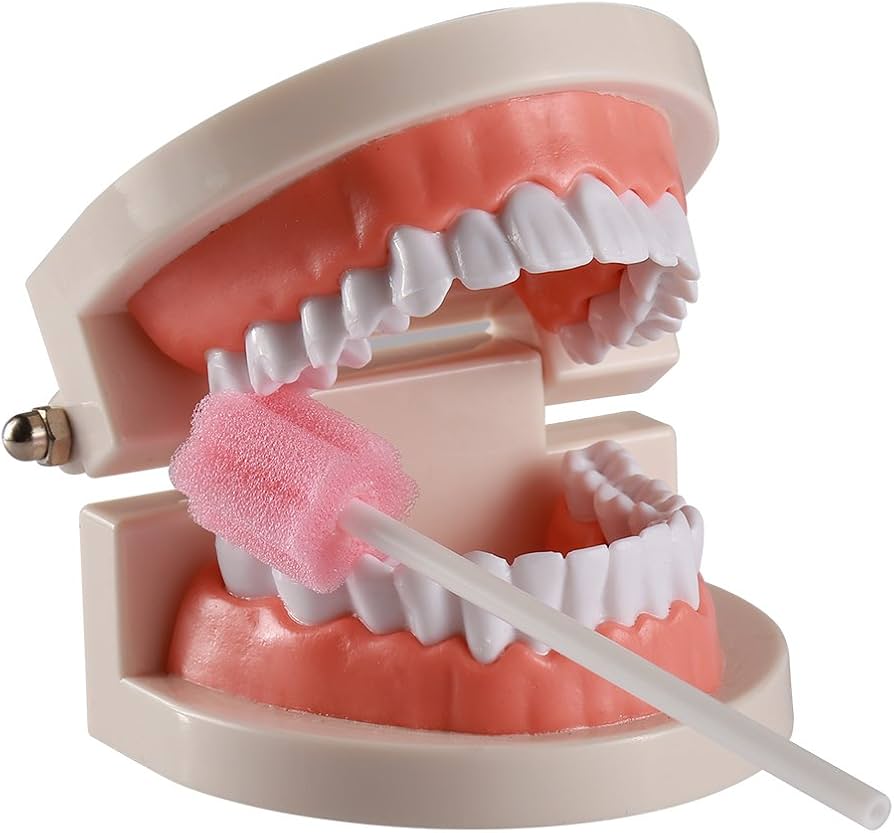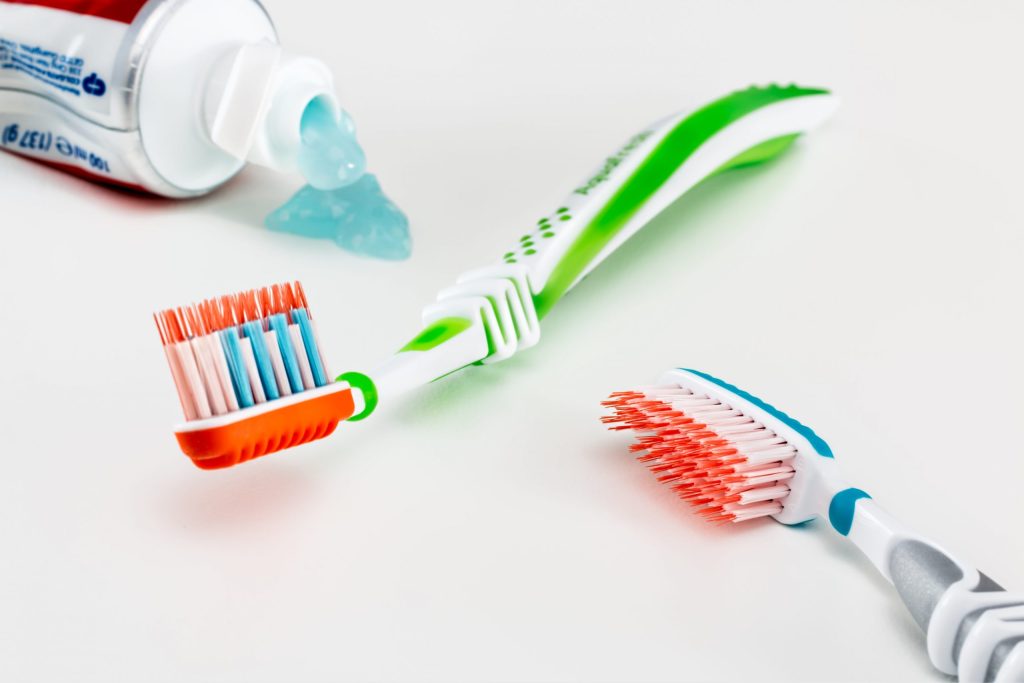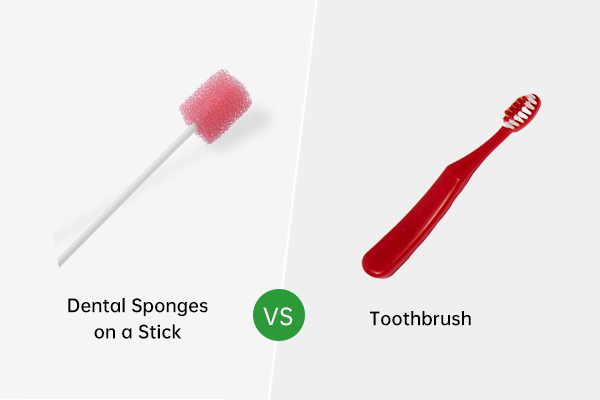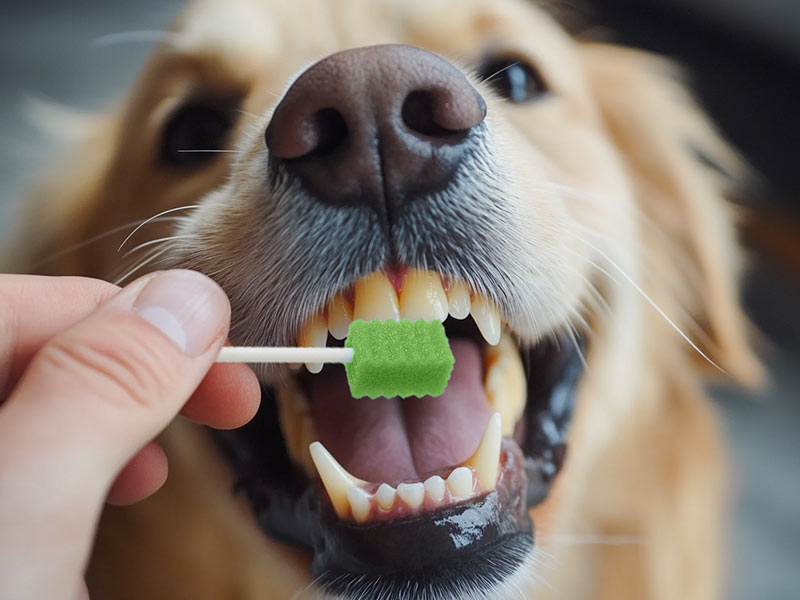When it comes to oral hygiene, the toothbrush has long been the default tool for maintaining a clean and healthy mouth. However, in recent years, dental sponges on a stick have gained recognition as an alternative, particularly for individuals with specific oral care needs.
This article explores the key differences between these two tools, delving into the unique advantages of dental sponges on a stick and highlighting scenarios where they excel over traditional toothbrushes.

What Are Dental Sponges on a Stick?
Dental sponges on a stick, also known as oral swabs or sponge toothbrushes, consist of a foam or soft sponge tip attached to a plastic stick. Usually, the purpose of these instruments is to moisten oral tissues, clean the mouth, and get rid of debris. Unlike conventional toothbrushes, which rely on bristles for scrubbing, dental sponges rely on their soft and absorbent material to clean gently without causing irritation.
Key Features of Dental Sponges on a Stick
- Soft, Non-Abrasive Tips: Designed for sensitive mouths, these sponges provide gentle cleaning without the risk of abrasion.
- Convenient Handle: The plastic stick ensures easy maneuverability, even for caregivers.
- Disposable: Many dental sponges are single-use, ensuring hygiene and reducing cross-contamination.
- Pre-Moistened Options: Some are pre-soaked with solutions like mouthwash, saline, or flavored agents to enhance comfort and cleanliness.

The Traditional Toothbrush
Toothbrushes, typically made of a plastic handle with nylon bristles, have been a staple of oral hygiene for decades. Used with toothpaste, they help remove food particles and plaque from teeth and gums. In order to accommodate differing oral hygiene requirements, toothbrushes are available in both manual and electric versions, with a variety of bristle kinds and styles.
Differences Between Dental Sponges on a Stick and Toothbrushes
1. Design and Structure
Toothbrushes:
Toothbrushes are equipped with bristles designed to scrub the teeth and gums. They come in manual or electric variants, each tailored for effective plaque removal.
Dental Sponges on a Stick:
These feature foam tips instead of bristles, making them much softer. Their primary purpose is to clean gently, often without requiring toothpaste.
2. Cleaning Mechanism
Toothbrushes:
The bristles mechanically clean the teeth by removing plaque, bacteria, and food debris. This requires proper technique and effort to ensure effective cleaning.
Dental Sponges on a Stick:
Dental sponges work by gently wiping away debris and absorbing saliva or food particles. They’re less effective at deep plaque removal but excel in providing comfort and hydration.
3. Target Users
Toothbrushes:
Suitable for most individuals who can perform regular oral hygiene routines independently.
Dental Sponges on a Stick:
Ideal for individuals with limited mobility, post-surgical recovery, or sensitive oral tissues. They’re also popular in healthcare settings for patients who cannot use traditional toothbrushes.
| Feature | Toothbrush | Dental Sponges |
| Design | Bristles; manual/electric. | Foam tip on a stick. |
| Cleaning | Scrubs plaque effectively. | Gentle debris removal. |
| Sensitivity | It may irritate sensitive gums. | Ideal for sensitive mouths. |
| Ease of Use | Requires proper technique. | Simple; for all users. |
| Hygiene | Reusable; needs cleaning. | Disposable; hygienic. |
| Users | General users. | Sensitive or post-surgery. |
| Use Cases | Daily plaque removal. | Caregiving, recovery, dry mouth. |

Advantages of Dental Sponges on a Stick
1. Gentle on Sensitive Oral Tissues
Because dental sponges are non-abrasive, they are ideal for people with:
- Post-Surgery Needs: After oral surgery, the gums and tissues are often tender. A toothbrush can aggravate the wound, whereas a dental sponge gently cleans without causing discomfort.
- Mouth Sores or Irritation: For those with ulcers, chemotherapy-related oral issues, or gingivitis, dental sponges provide a soothing alternative.
- Elderly Care: Aging often brings increased oral sensitivity, and sponges on a stick cater to this demographic by minimizing discomfort.
2. Hydration and Comfort
One unique advantage of dental sponges is their ability to hydrate the mouth. Many sponges are pre-moistened with saline or refreshing solutions, making them an excellent choice for individuals experiencing:
- Dry Mouth (Xerostomia): Common in individuals undergoing medication or chemotherapy, dental sponges help keep the oral cavity moist.
- Prolonged Illness or Hospitalization: Patients unable to brush due to medical conditions benefit from the moisturizing effect of sponges.
3. Ease of Use
Unlike toothbrushes, which require proper technique, dental sponges are incredibly simple to use:
- For Caregivers: Dental sponges are a boon for caregivers providing oral care to individuals with physical or cognitive limitations.
- For Children: Children, especially those who dislike bristles or are learning oral hygiene, find dental sponges less intimidating and easier to tolerate.
4. Hygienic and Disposable
Since most dental sponges are single-use, there is no chance of bacterial accumulation. This is particularly beneficial in:
- Healthcare Settings: Dental sponges ensure hygiene when caring for multiple patients.
- Infection Control: Disposable sponges lower the chance of cross-contamination, particularly in settings like nursing homes and hospitals.
5. Perfect for Short-Term or Specific Use
In certain situations, a toothbrush might not be useful. Dental sponges shine in these scenarios:
- Post-Dental Procedures: After extractions or surgeries, using a toothbrush may be painful. Dental sponges provide a temporary yet effective alternative.
- Palliative Care: For patients nearing the end of life, dental care focuses on comfort rather than thorough cleaning. Dental sponges offer gentle care during this stage.
Scenarios Where Dental Sponges Outperform Toothbrushes
- Post-Surgery Recovery:
Following dental surgeries like wisdom tooth removal, dental implants, or gum grafts, the mouth is often too tender for brushing. Sponges help maintain cleanliness without aggravating sensitive areas.
- Patients with Neurological Disorders:
People who suffer from conditions like Parkinson’s disease or stroke often struggle with fine motor skills, which makes using a toothbrush challenging. Dental sponges offer a practical alternative.
- Patients Receiving Chemotherapy:
Chemotherapy may result in uncomfortable mouth sores. The non-abrasive nature of dental sponges ensures comfort during oral care.
- Hospice and Elderly Care:
Dental sponges simplify oral hygiene for bedridden individuals or those in palliative care, focusing on comfort and moisture.
- Young Children Learning Oral Hygiene:
Dental sponges are less intimidating than traditional toothbrushes, helping children become accustomed to oral care routines.
Practical Tips for Using Dental Sponges on a Stick
- Choose Pre-Moistened Options:
Look for sponges infused with refreshing or therapeutic solutions for added comfort.
- Use in Conjunction with a Toothbrush:
While dental sponges are excellent for temporary or specialized needs, they should not replace toothbrushes for long-term oral health.
- Dispose After Each Use:
Single-use sponges ensure hygiene and prevent cross-contamination.
- Consult a Dentist:
Always seek professional advice when incorporating new tools into your oral care routine, especially after surgery or during illness.
A Future of Coexistence: Combining Tools for Optimal Oral Care
It would be more realistic to think of dental sponges and toothbrushes as complementary instruments rather than rivals. Each has a unique purpose, and together, they greatly improve dental hygiene routines.
Example Routines
- Daily Use: To get rid of plaque and avoid cavities, a toothbrush is still necessary.
- Post-Surgery Care: Transition to dental sponges temporarily to allow healing before resuming regular brushing.
- Caregiver Support: Use dental sponges for individuals with mobility or cognitive limitations, supplementing with professional dental cleanings as needed.
Conclusion
Dental sponges on a stick provide a revolutionary alternative to toothbrushes in specific situations, offering unmatched gentleness, hydration, and convenience. While toothbrushes remain indispensable for most people, dental sponges cater to those with sensitive mouths, post-surgical needs, or mobility challenges. By understanding the strengths of each tool, individuals and caregivers can make informed choices that prioritize both hygiene and comfort.
If you have more questions about Dental sponges on a stick, as a mature oral swab supplier, we are happy to help you.




